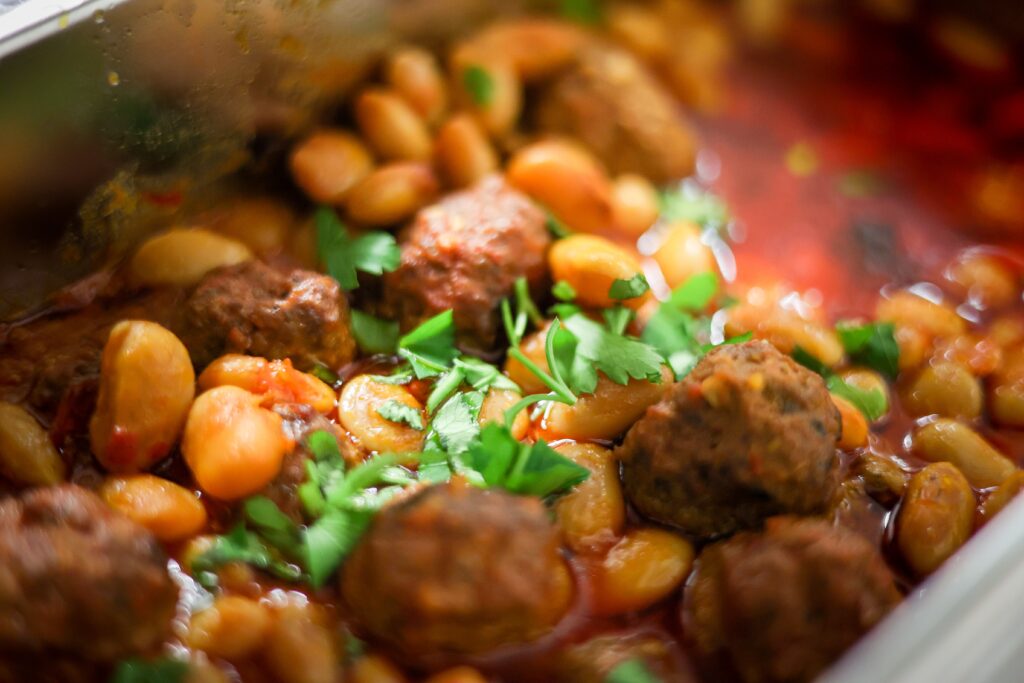Feeling guilty about those pastry indulgences or potato chip binges? Perhaps you’re considering eliminating carbs from your meals altogether in an attempt to shed those stubborn pounds. Well, pause for a moment, because the truth is not as clear-cut as it seems. You see, not all carbs are bad! The right ones can aid weight management, stave off hunger, and satisfy your palate such as slow carbs.
In this article

While there’s no magic “fat-burning” food, certain foods, like slow carbs, can boost the process. Slow carbs have a low glycemic index, digest slowly, prevent insulin spikes, and keep you full. Cutting back on refined carbs and choosing slow and complex ones is key.
What are slow carbs? Slow carbs are carbohydrates that our bodies break down and absorb at a slower pace, resulting in a steadier release of energy and more controlled blood sugar levels. They are found in foods like whole grains, legumes, vegetables, and certain fruits.
Why do we need carbs?
Not only do they make our taste buds dance with joy when we bite into a warm, freshly baked loaf of bread, but carbohydrates also serve a fundamental purpose in our bodies. You see, carbs are like the fuel that keeps our engine running smoothly – just like petrol in a car.
When we eat carbs, our amazing digestive system breaks them down into their simplest form: sugar, specifically glucose. This mighty glucose is then absorbed into our bloodstream and becomes the go-to energy source for our brains and muscles.
So, while we may sometimes hear negative things about carbs, it’s important to remember that they play a crucial role in keeping our bodies functioning optimally. Carbs provide the energy we need to think, move, and live our lives to the fullest.
Now, don’t get carried away and start devouring heaps of sugar-laden treats in the name of carbs. It’s all about balance and choosing the right kinds of carbs.
What are slow carbs?
Slow carbs, are a specific type of carbohydrates that provide sustained energy, promote satiety, and help you achieve your weight loss goals effectively and healthily. Unlike their fast-carb counterparts that quickly spike your blood sugar levels, slow carbs are digested gradually, resulting in a slower and steadier release of glucose into your bloodstream.
This controlled release helps maintain stable energy levels, prevents crashes, and keeps those hunger pangs at bay.
The key characteristic of slow carbs lies in their low glycemic index (GI). The glycemic index is a measure of how quickly carbohydrates are broken down and raise blood sugar levels. Foods with a low GI are considered slow carbs as they produce a gradual and steady rise in blood sugar.
Slow carbs that you should add to your diet
Here are some slow carbs that you should consider adding to your diet:
- Whole grains: Whole grains such as quinoa, brown rice, oats, and barley are excellent sources of slow carbs. They are high in fiber and nutrients, which contribute to better digestion and overall health.
- Legumes: Beans, lentils, and chickpeas provide a good amount of protein and fiber. They are also low in fat and contain important minerals and vitamins.
- Slow carb vegetables: Many vegetables, such as broccoli, spinach, kale, and Brussels sprouts, contain slow carbs along with a wide range of essential nutrients. These non-starchy vegetables are low in calories and high in fiber, making them ideal for a healthy diet.
- Slow carb fruits: While most fruits contain natural sugars, some have a lower glycemic index and can be considered slow carbs. Examples include berries (strawberries, blueberries, raspberries), apples, and citrus fruits. These fruits provide valuable antioxidants and fiber.
- Nuts and seeds: Almonds, walnuts, chia seeds, flaxseeds, and pumpkin seeds are rich in healthy fats, and protein. They also offer other health benefits, such as reducing inflammation and supporting heart health.

What are the benefits of a slow carb diet?
The benefits of slow carbs are numerous:
- Steady energy: Slow carbs are digested at a slower pace, providing a steady release of energy over time, instead of a quick spike followed by a crash.
- Weight management: Foods with slow carbs are typically high in fiber, which can help you feel full longer, potentially aiding in weight management.
- Blood sugar control: Slow carbs cause a slower, more steady rise in blood sugar levels than fast carbs, which can be beneficial for people with diabetes and those at risk. Research suggests that low carbohydrate diets, including those that incorporate slow carbs can improve insulin sensitivity and contribute to better blood sugar control.
- Heart health: Low-carbohydrate diets that emphasize slow carbs from sources like vegetables, legumes, and whole grains have been associated with improved heart health. Research shows that these diets can lower triglyceride levels, increase beneficial HDL cholesterol, and reduce the risk of heart disease.
- Digestive health: Many slow carb foods are high in fiber, promoting regular bowel movements and contributing to overall digestive health.
Some key considerations
When embarking on a slow carb diet, there are a few considerations to keep in mind. While slow carbs can be beneficial for weight management and overall health, it’s essential to approach the diet in a balanced and sustainable way. Here are some key considerations:
- Portion Control: While slow carbs are beneficial, it’s crucial to practice portion control. Keep an eye on your overall calorie intake and ensure that slow carbs are part of a well-balanced meal. Remember, calories still matter when it comes to weight management, so be mindful of portion sizes.
- Combine with protein and healthy fats: To enhance the nutritional value and satiety of your meals, pair slow carbs with lean proteins and healthy fats. Protein and fats can help balance blood sugar levels, increase feelings of fullness, and provide essential nutrients.
- Monitor Overall Macronutrient Balance: While slow carbs are a vital component, it’s essential to consider the overall macronutrient balance of your diet. Ensure you’re getting an adequate amount of protein, healthy fats, and other essential nutrients alongside slow carbs.
Frequently asked questions (FAQ)
Got more questions about what are slow carbs? Check out some commonly asked questions about this topic below.
What foods are considered to be slow carbs?
Foods that are rich in slow carbs include whole grains, legumes, vegetables, and certain fruits. These foods are high in fiber, which slows down the digestion process, leading to a slower release of glucose into the bloodstream.
How do slow carbs contribute to weight management?
Slow carbs are digested at a slower pace, leading to a more sustained feeling of fullness. This can prevent overeating and snack cravings, thereby assisting with weight management.
Are there potential side effects to consuming slow carbs?
Generally, slow carbs are beneficial and side effects are minimal. However, drastically increasing fiber intake (common in slow carb foods) can sometimes cause digestive discomfort like bloating or gas. As always, it’s advised to consult with a healthcare professional when making significant dietary changes.
Final Word
So, have we helped to clear up the mystery surrounding slow carbs for you? We certainly hope so. Understanding the role of slow carbs can be a game changer in managing your energy levels, controlling blood sugar, and even assisting in weight management.
If you found the insights shared here beneficial, don’t hesitate to share this with a friend. For more in-depth articles on similar topics, do explore the rest of my blog. There’s always more to learn, more to discover, and more ways to take proactive steps toward better health.
